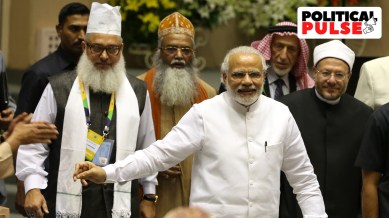For its plans to amend the Waqf Act, Modi govt finds a familiar supporter: Sufi council
All India Sufi Sajjadanashin Council supports plans for changes in the Act calling the same long overdue, also calls for a Dargah Board

Amid the ongoing tussle between the government and Opposition over the proposal to amend the Waqf Act, the All India Sufi Sajjadanashin Council (AISSC) on Tuesday said that it supports the government’s proposal to amend the Act and that it was long overdue.
Government sources have maintained that a Bill will soon be tabled in Parliament to amend the 1995 law governing Waqf Boards. It has said that the new Bill will “ensure more accountability and transparency in their functioning and mandatory inclusion of women in these bodies”.
monthly limit of free stories.
with an Express account.
At a press conference in New Delhi on Tuesday, AISSC chairman Syed Naseeruddin Chishty, who is also the successor of the Ajmer Sharif Dargah’s Dewan, said that a separate Dargah Board should be introduced under the amendments to the Waqf Act.
“In the Waqf Act currently effective, there is no mention of dargahs at all. The Waqf Boards do not recognise the traditions of the dargah as many of our traditions are not there in sharia, so we demand a separate Dargah Board,” he said.
Chishty claimed the Waqf Boards work in a “dictatorial manner” in their present form and have no transparency.
“We are hopeful that the draft Waqf Amendment Bill will be comprehensive and serve the interests of all stakeholders. Following a thorough examination of the draft, we intend to submit our recommendations and proposal,” he added.
Others who were present at the press conference included Abdul Qadhar Qadri, national coordinator of the AISSC, Hyderabad; Syed Ali Zaki, Hussaini, Karnataka state president of the AISSC; and Fareed Ahmed Nizami, head of the Nizamuddin Auliya dargah and Delhi president of the AISSC.
The AISSC representatives, including its chairman, met National Security Advisor (NSA) Ajit Doval and Union Minority Affairs Minister Kiren Rijiju on Monday and raised their concerns.
“We were given assurance by the NSA and the Minority Affairs Minister that all the stakeholders will be consulted and the amendments will be in the interest of Muslims,” Chishty said.
He also said that Opposition leaders should not politicise the matter and wait for the Bill to be tabled in Parliament before opposing it. “They are saying it is against Muslims without even reading the draft of the Bill,” he said.
On Tuesday, Rijiju said the AISSC delegation discussed a range of important issues concerning the Muslim community and added that it was a “fruitful” and “forward looking” discussion.
“Last evening a delegation of the All India Sufi Sajjadanashin Council (AISSC) comprising the most revered & prominent Sajjadanashins from various Dargahs across India met me under the leadership of Shri Syed Naseruddin Chishty, Chairman & Successor of the Present Spiritual Head of Ajmer Dargah to discuss a range of important issues concerning the Muslim community. It was a fruitful & forward looking discussion. They lauded & praised the efforts of PM Shri @narendramodi ji towards the welfare of the entire community and minorities in general. They also committed themselves towards the Sankalp of Viksit Bharat 2047. Shri Shehzad Poonawalla, national spokesperson of BJP, was also present,” Rijiju said in a post on X.
Since reports emerged of the government’s plans to amend the Waqf Act, several Opposition parties have said they would resist any plans by the government to bring a Bill in Parliament to make changes in the Waqf law.
The BJP has said such a Bill is necessary to bring “transparency” in the management of waqf properties across the country. The Congress, though, is yet to comment on the issue.
Government sources told The Indian Express that as many as 40 amendments to the Wakf Act are under consideration, including curtailing the powers of Waqf Boards, through a Bill likely to be tabled in Parliament this week. Among other things, the amendments will make it mandatory to include women in Waqf bodies, said sources in the government, adding that “the move comes in the backdrop of demands from within the Muslim community”.
The All India Muslim Personal Law Board (AIMPLB) had Sunday said that any interference with the nature of the Waqf properties and legal status and powers of the Waqf Boards will not be tolerated. It urged the NDA allies and the Opposition parties to “completely reject any such move” and not allow such amendments to be passed in Parliament.
At its inter-faith conference in New Delhi two years ago, which was attended by Ajit Doval, the AISSC had passed a resolution, calling for banning the Popular Front of India (PFI) and any religious organisation involved in radicalism.
The AISSC’s move to demand a clamp-down on the PFI was in sync with the stand it had taken on several issues – from seeking curbs on radical Islamic factions in the country to backing various Narendra Modi government’s announcements with regard to the Muslim community.
The AISSC has, however, regularly drawn criticism from other Muslim organisations, and even from within the Sufi groups at times, for being “too close to the central government”.